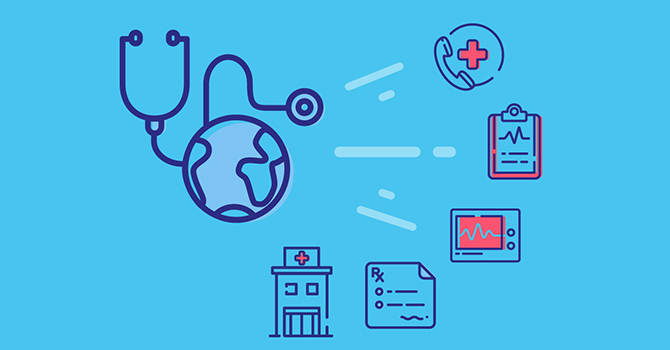The Relevance of Healthcare RCM in Enhancing Cash Flow and Performance
The Relevance of Healthcare RCM in Enhancing Cash Flow and Performance
Blog Article
Unveiling the Perks of Health Care RCM in Improving Efficiency and Precision in Income Cycle Management
In the rapidly evolving health care landscape, the value of Revenue Cycle Management (RCM) can not be overemphasized. As medical care service providers strive for precision and performance, RCM arises as a pivotal device in simplifying procedures, minimizing mistakes, and enhancing economic results.
Simplifying Administrative Tasks

Additionally, the assimilation of electronic wellness records (EHR) with RCM systems assists in real-time data gain access to and sharing, allowing health care specialists to make informed decisions promptly. This interconnectedness not only boosts communication in between scientific and administrative groups however additionally enhances patient satisfaction by lowering waiting times and invoicing discrepancies - Healthcare RCM. Additionally, structured management procedures allow for much better compliance with governing requirements, mitigating dangers related to audits and charges
Inevitably, the concentrate on refining management jobs in RCM brings about set you back savings and improved economic efficiency. By purchasing automation and maximizing workflows, medical care organizations can achieve a more sustainable profits cycle, ensuring long-lasting viability and the ability to adapt to evolving sector needs.
Enhancing Cases Processing
Exactly how can healthcare organizations enhance the efficiency of their insurance claims processing? By harnessing automation and sophisticated analytics, RCM systems streamline the complicated and usually cumbersome claims processing tasks.
Moreover, real-time analytics play a pivotal role in improving claims refining effectiveness. These analytics tools provide insights right into bottlenecks and prospective denials, enabling health care suppliers to attend to issues proactively. Predictive analytics can anticipate patterns in insurance claim denials, enabling preemptive actions to minimize them, therefore lowering the time considered cases to be refined and accepted.
Additionally, the adoption of electronic health documents (EHR) integrated with RCM systems ensures smooth information flow, reducing redundancies and boosting the accuracy of information sent in insurance claims. A consistent responses loophole assisted in by RCM systems better improves the process, promoting continuous renovation.
Ultimately, by leveraging technology-driven solutions in claims processing, health care companies can improve functional efficiency, improve capital, and give a smoother experience for individuals and staff alike.
Reducing Economic Errors
Accurate monetary monitoring is important in healthcare, where decreasing financial mistakes can dramatically affect operational success. Financial errors, whether due to incorrect invoicing, coding inaccuracies, or mismanagement of client accounts, can result in significant profits loss and strained connections with payers and clients. Addressing these errors is essential to maintain a medical care company's monetary health and wellness and enhance its credibility.
Medical Care Revenue Cycle Monitoring (RCM) plays a pivotal function in decreasing such errors with structured procedures. By executing standard treatments for invoicing, coding, and collections, doctor can guarantee that economic deals are handled with accuracy. Comprehensive training for staff on current coding laws and payment techniques additionally lowers the possibility of errors, making certain cases are correctly refined and reimbursed.

In addition, thorough audits and normal financial reviews within the RCM framework enable the very early discovery and correction of discrepancies. Making sure accuracy in client information entry and confirmation further mitigates errors, as this is usually a main resource of mistakes. By concentrating on these calculated areas, medical care organizations can reduce financial errors, thereby protecting their revenue streams and enhancing total functional efficiency.
Leveraging Advanced Technologies
In today's quickly advancing medical care landscape, leveraging innovative modern technologies is essential for enhancing Earnings Cycle Monitoring (RCM) processes. By integrating cutting-edge solutions such as man-made intelligence (AI), artificial intelligence (ML), and robot procedure automation (RPA), doctor can considerably improve the performance and precision of their RCM procedures. These innovations aid in streamlining repetitive tasks, lowering manual mistakes, and making it possible for much faster handling of insurance claims.

Moreover, the integration of blockchain innovation enhances data protection and openness within RCM (Healthcare RCM). It ensures that delicate info is protected while keeping an immutable document of purchases. This is important for building depend on with people and stakeholders
Boosting Financial Efficiency
Structure on the efficiencies obtained with advanced innovations, medical care service providers can substantially increase their monetary efficiency by fine-tuning their Revenue Cycle Management (RCM) strategies. By enhancing billing processes, reducing case denials, and enhancing cash money circulation, medical care establishments can accomplish better monetary stability.
Moreover, information analytics within RCM systems provide useful understandings right into financial fads and operational traffic useful site jams. By leveraging these understandings, healthcare providers can make educated choices to enhance monetary end results, such as changing billing methods or renegotiating payer contracts. Boosted precision in coding and documents even more lowers claim rejections and audits, promoting a smooth income cycle.
Furthermore, person engagement tools integrated within RCM systems enhance individual complete satisfaction by providing clear billing details and versatile repayment alternatives. This transparency not only improves patient-provider relationships but likewise encourages timely repayments, decreasing outstanding accounts receivables.
Final Thought
Health Care Earnings Cycle Monitoring considerably optimizes performance and accuracy by streamlining management tasks and improving insurance claims handling. Via the reduction of monetary mistakes and the integration of innovative modern technologies such as AI and predictive analytics, RCM promotes conformity with payment codes and offers valuable understandings into economic trends. This organized method not only decreases possible claim denials however also increases economic efficiency, therefore fostering count on and transparency with people and stakeholders within the healthcare system.
As healthcare providers make every effort for precision and performance, RCM emerges as an essential tool in streamlining procedures, lessening errors, and enhancing monetary results.Streamlining administrative jobs in health care profits cycle administration (RCM) provides substantial advantages by improving operational efficiency and reducing the worry on team.Healthcare Income Cycle Management (RCM) plays a critical function in lessening such errors with structured processes.In today's swiftly developing health care landscape, leveraging advanced technologies is necessary for optimizing Profits Cycle Monitoring (RCM) processes.Structure on the performances gained via advanced innovations, healthcare service providers can significantly enhance their monetary performance this contact form by refining their Income Cycle Monitoring (RCM) approaches.
Report this page